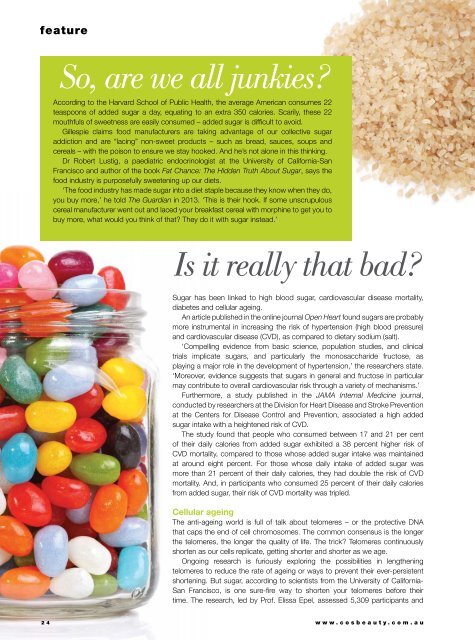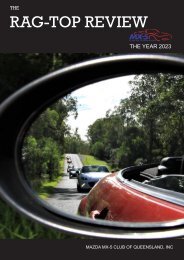Cosmetic Surgery and Beauty Magazine #68
Create successful ePaper yourself
Turn your PDF publications into a flip-book with our unique Google optimized e-Paper software.
feature<br />
So, are we all junkies?<br />
According to the Harvard School of Public Health, the average American consumes 22<br />
teaspoons of added sugar a day, equating to an extra 350 calories. Scarily, these 22<br />
mouthfuls of sweetness are easily consumed – added sugar is difficult to avoid.<br />
Gillespie claims food manufacturers are taking advantage of our collective sugar<br />
addiction <strong>and</strong> are “lacing” non-sweet products – such as bread, sauces, soups <strong>and</strong><br />
cereals – with the poison to ensure we stay hooked. And he’s not alone in this thinking.<br />
Dr Robert Lustig, a paediatric endocrinologist at the University of California-San<br />
Francisco <strong>and</strong> author of the book Fat Chance: The Hidden Truth About Sugar, says the<br />
food industry is purposefully sweetening up our diets.<br />
‘The food industry has made sugar into a diet staple because they know when they do,<br />
you buy more,’ he told The Guardian in 2013. ‘This is their hook. If some unscrupulous<br />
cereal manufacturer went out <strong>and</strong> laced your breakfast cereal with morphine to get you to<br />
buy more, what would you think of that? They do it with sugar instead.’<br />
Is it really that bad?<br />
Sugar has been linked to high blood sugar, cardiovascular disease mortality,<br />
diabetes <strong>and</strong> cellular ageing.<br />
An article published in the online journal Open Heart found sugars are probably<br />
more instrumental in increasing the risk of hypertension (high blood pressure)<br />
<strong>and</strong> cardiovascular disease (CVD), as compared to dietary sodium (salt).<br />
‘Compelling evidence from basic science, population studies, <strong>and</strong> clinical<br />
trials implicate sugars, <strong>and</strong> particularly the monosaccharide fructose, as<br />
playing a major role in the development of hypertension,’ the researchers state.<br />
‘Moreover, evidence suggests that sugars in general <strong>and</strong> fructose in particular<br />
may contribute to overall cardiovascular risk through a variety of mechanisms.’<br />
Furthermore, a study published in the JAMA Internal Medicine journal,<br />
conducted by researchers at the Division for Heart Disease <strong>and</strong> Stroke Prevention<br />
at the Centers for Disease Control <strong>and</strong> Prevention, associated a high added<br />
sugar intake with a heightened risk of CVD.<br />
The study found that people who consumed between 17 <strong>and</strong> 21 per cent<br />
of their daily calories from added sugar exhibited a 38 percent higher risk of<br />
CVD mortality, compared to those whose added sugar intake was maintained<br />
at around eight percent. For those whose daily intake of added sugar was<br />
more than 21 percent of their daily calories, they had double the risk of CVD<br />
mortality. And, in participants who consumed 25 percent of their daily calories<br />
from added sugar, their risk of CVD mortality was tripled.<br />
Cellular ageing<br />
The anti-ageing world is full of talk about telomeres – or the protective DNA<br />
that caps the end of cell chromosomes. The common consensus is the longer<br />
the telomeres, the longer the quality of life. The trick? Telomeres continuously<br />
shorten as our cells replicate, getting shorter <strong>and</strong> shorter as we age.<br />
Ongoing research is furiously exploring the possibilities in lengthening<br />
telomeres to reduce the rate of ageing or ways to prevent their ever-persistent<br />
shortening. But sugar, according to scientists from the University of California-<br />
San Francisco, is one sure-fire way to shorten your telomeres before their<br />
time. The research, led by Prof. Elissa Epel, assessed 5,309 participants <strong>and</strong><br />
24 www.cosbeauty.com.au


















